
Introduction: Mental Health and Wellness
Mental health and wellness are crucial for happiness but are often overlooked or misunderstood. Even with growing awareness, many people still grapple with false beliefs and stigma that prevent them from seeking help.
Stress can negatively impact our mental and emotional health in today’s fast-paced world, highlighting the need to prioritize mental well-being. If we don’t do it, who will? It’s time to confront the myths and recognize that mental health should be a daily focus.
This guide helps you understand the key aspects of mental health and wellness. You learn how to improve mental health by addressing key factors, recognizing early warning signs, and adopting sustainable wellness practices.
Key Takeaways
- Prioritize mental wellness as a lifelong commitment
- Build resilience with small, consistent habits
- Strengthen emotional well-being through self-care and mindfulness
- Seek support to foster healing and personal growth
- Take control of your mental health with intentional action
Contents
Understanding Mental Health and Wellness
Key Insight from This Section:
Mental health is your foundation—how you think, feel, and cope—while mental wellness is the ongoing effort to strengthen that foundation through mindful habits, emotional care, and intentional self-growth.
What We Explore:
- What Is Mental Health?
- What Is Mental Wellness?
- How Do They Connect?
Mental health and wellness enable you to face life’s challenges with increased resilience and clarity.
What Is Mental Health?
Mental health is more than just our thoughts—it’s the foundation of our emotional, social, and behavioral well-being. It shapes how we think, feel, interact with others, and handle life’s ups and downs.
Mental health has four key aspects:
- Psychological Health – The ability to think critically and creatively, learn, and stay self-aware.
- Emotional Health – Understanding and managing feelings in a healthy way.
- Social Health – Building connections and feeling a sense of belonging.
- Behavioral Health – Refers to our actions influencing our mental and emotional well-being.
Our mental health exists on a spectrum. Some days, we may feel happy and balanced, while other times, we might struggle with stress, anxiety, or low mood. It’s often measured by how well we handle challenges, maintain relationships, and make decisions.
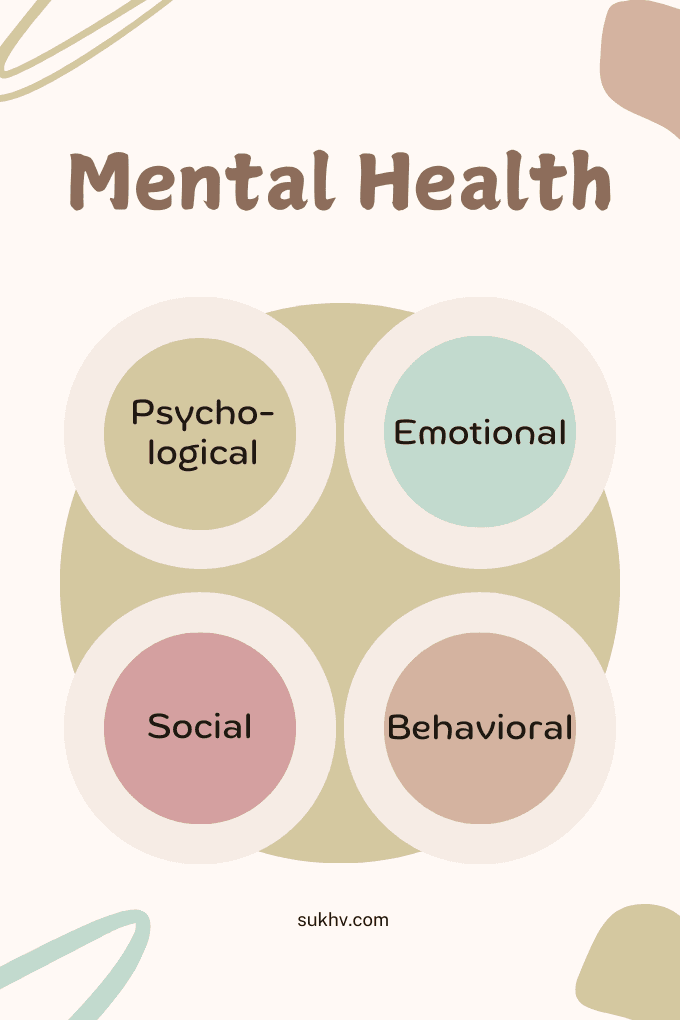
What Does It Mean to Be Mentally Healthy?
Strong mental health isn’t about never feeling stressed or upset—it’s about having the resilience to navigate life’s highs and lows. Some signs of good mental health include:
- Self-awareness and emotional strength
- Flexibility in adapting to change
- Empathy and strong relationships
- A sense of purpose and fulfillment
- The ability to enjoy life despite challenges
Mental Health vs. Mental Illness
A common misconception is that mental health and mental illness are the same. In reality, we all have mental health, just like we all have physical health. Mental illness, on the other hand, includes conditions like anxiety or depression that can disrupt well-being.
Taking care of your mental health doesn’t mean avoiding problems—it means building the strength to handle them healthily.
Mental health is a universal aspect of our lives—it's not the absence of challenges but the ability to face them with resilience and balance. Share on XMental Health in Everyday Life
To understand how mental health shows up in real life, here are some examples:
- Psychological Health – Imagine you’re working on a tight deadline. Instead of feeling overwhelmed, you break the task into smaller steps, stay focused, and adjust your plan.
- Emotional Health – During a disagreement with someone close, instead of reacting in anger, you recognize your emotions, express them calmly, and listen to their perspective with an open mind.
- Social Health – A friend is going through a tough time. You offer support by listening, checking in regularly, and respecting their space while maintaining your well-being.
- Behavioral Health – When stress hits, instead of turning to unhealthy habits like excessive screen time or skipping meals, you go for a walk, practice deep breathing, or journal your thoughts.
Just like physical health, mental health needs regular care. Small, consistent habits can make a big difference: Practice mindfulness to stay present, take time for self-reflection, stay active with regular exercise, build meaningful relationships, and seek support when required.
Prioritizing your mental health helps you lead a balanced and fulfilling life.
What Is Mental Wellness?
It’s More Than Just Mental Health
Many people use “mental health” and “mental wellness” interchangeably, but they’re not the same. Understanding the difference is key to improving overall well-being. I learned this the hard way—my mental health suffered because I didn’t realize what mental wellness was and how much it mattered.

Mental wellness isn’t just the absence of mental illness—it’s about thriving. It means feeling emotionally balanced, handling stress effectively, and navigating life’s challenges with resilience.
Think of it like physical fitness. Just as regular exercise and a healthy diet keep your body strong, prioritizing mental wellness strengthens your mind.
Mental wellness supports your well-being across multiple dimensions—mental, emotional, social, and psychological.
How Does Mental Wellness Differ from Mental Health?
Mental health refers to our overall psychological well-being—how we think, feel, and behave. It can fluctuate due to life circumstances, genetics, and other factors.
Mental wellness, on the other hand, is about actively caring for our minds so we can maintain a balanced perspective, build resilience, and appreciate life’s moments—regardless of challenges.
Just as physical fitness supports overall health, mental wellness maintains and improves our mental health. It requires consistent effort—like practicing mindfulness, relaxation techniques, and setting boundaries to protect our emotional space.
Mental health reflects our experiences, while mental wellness is what we nurture. Just as physical fitness strengthens the body, mental wellness fortifies the mind. Share on XMental wellness strengthens one’s sense of purpose, self-awareness, and emotional flexibility, helping one navigate setbacks without feeling overwhelmed.
When you recognize the difference between mental health and mental wellness, you become more aware of your mental health and can take intentional steps to strengthen your mental wellness.
How Are Mental Health and Mental Wellness Connected?
Mental health and mental wellness go hand in hand. Good mental health is essential because it lays the foundation for overall well-being, while actively nurturing mental wellness helps strengthen and protect that foundation.
Mental Health: The Foundation of Well-Being
Think of mental health as the foundation of a house. It includes your emotional, psychological, social, and behavioral well-being—shaping how you think, feel, and interact with others. Like a strong foundation keeps a house stable, good mental health supports resilience and overall quality of life.
However, mental health isn’t just about feeling good all the time. It’s influenced by genetics, environment, and life experiences, which means challenges can arise even when you’ve built a solid foundation.
Mental Wellness: Protecting and Strengthening the Foundation
Mental wellness is the ongoing effort to maintain and enhance your mental health.
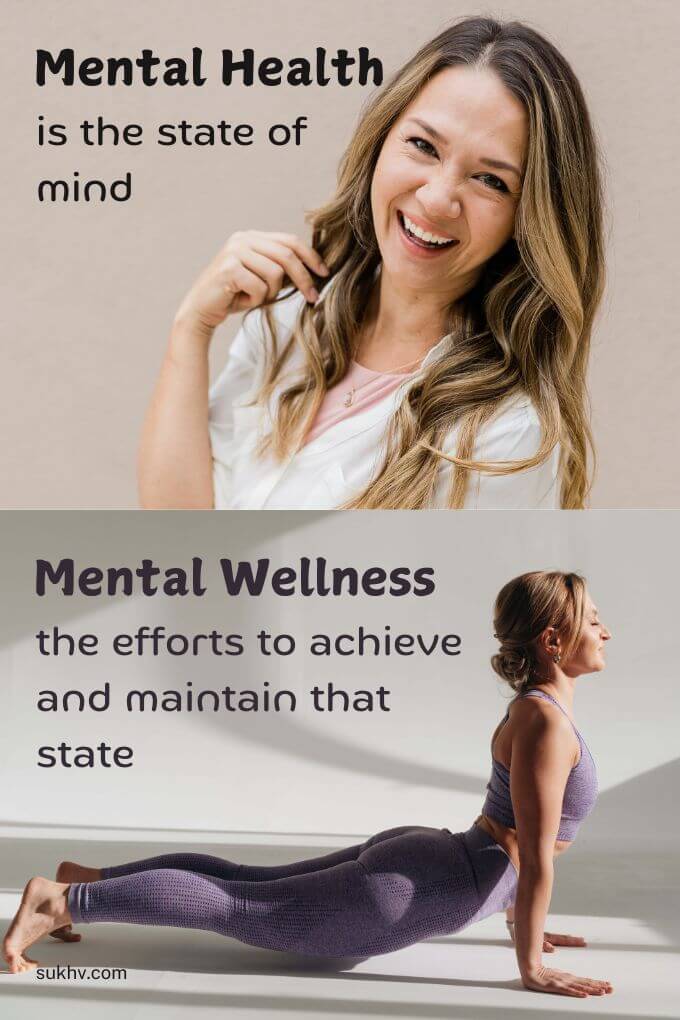
It’s about your daily choices—prioritizing self-care, nurturing healthy relationships, managing stress, and seeking support when needed. Unlike mental health, which can be affected by external factors, mental wellness is something you can actively work on.
Mental health is the foundation, but mental wellness is how you strengthen and protect it—through self-care, relationships, and daily choices. Share on XEven when dealing with mental health challenges, you can still improve your mental wellness. Simple actions—like spending time with supportive people, practicing stress-relief techniques, and doing things you enjoy—can make a big difference. This highlights how closely mental wellness and mental health are connected. When you focus on mental wellness, you’re taking steps to prevent your mental health from worsening.
But if you neglect mental wellness, it can weaken your ability to cope with stress, anxiety, and emotional challenges, making it harder to maintain good mental health.
The Relationship Between Mental and Emotional Health
Key Insight from This Section:
Emotional and mental health constantly influence each other; strengthening one supports the other. By understanding your emotions, you nurture mental resilience, deepen relationships, and create lasting well-being.
What We Explore:
- What is Emotional Health?
- Mental & Emotional Health Linked
- Importance of Emotional Awareness
What Do We Mean by Emotional Health?
Emotional health is about understanding, managing, and expressing our positive and negative emotions in a way that supports our well-being and helps us make balanced decisions. It’s not about avoiding emotional difficulties but learning how to navigate them effectively.

The Role of Emotions in Everyday Life
Emotions influence almost everything we do, often without us realizing it. They shape our decisions, reactions, and interactions with others.
For instance, happiness can inspire you to take bold steps toward your dreams, while sadness may signal the need for self-reflection and healing. Anxiety, though uncomfortable, can also be helpful—it encourages preparation and careful decision-making.
Our emotions don’t just affect us individually; they play a crucial role in our relationships. How we express and manage our feelings impacts how we connect with others, communicate, and build trust.
What Does It Mean to Be Emotionally Healthy?
Being emotionally healthy doesn’t mean feeling happy all the time. Instead, it means responding to emotions in a way that fosters resilience, self-awareness, and meaningful connections. Emotionally healthy people:
- recognize and understand their feelings and how they influence their actions;
- manage stress effectively through mindfulness, deep breathing, or seeking support when needed;
- build strong relationships by practicing empathy, kindness, and clear communication;
- express their feelings openly and set boundaries without guilt;
- and find purpose and fulfillment in both personal and professional life.
They also practice gratitude and maintain a positive outlook, which helps them navigate life’s ups and downs.
Healthy Expression vs. Suppression
Emotional health isn’t about suppressing feelings but constructively expressing them. Instead of reacting with anger in conflict, an emotionally healthy person remains calm and communicates assertively. When faced with disappointment, they acknowledge their feelings but don’t let them spiral into hopelessness.
At its core, emotional health is about responding to your emotions in ways that support personal growth, mental clarity, and inner peace. The better you understand and manage your feelings, the more resilient and fulfilled you become.
How Do Mental and Emotional Health Impact Each Other?
Mental and emotional health are closely connected, constantly shaping and influencing one another. When one thrives, the other benefits—but when one struggles, the effects ripple through both.
How Does Emotional Health Shape Mental Well-Being?
Your emotions—joy, sadness, anger, fear—are more than passing feelings; they provide insight into your inner world and influence how you react to life. When you understand and manage emotions well, you create a solid foundation for mental well-being.
Emotional health acts as a shield against stress. It helps you regulate your reactions, preventing difficult emotions from overwhelming your mind.
Positive emotional health enhances relationships, which are vital for happiness and resilience. Meaningful connections provide support, a sense of belonging, and protection against life’s ups and downs.
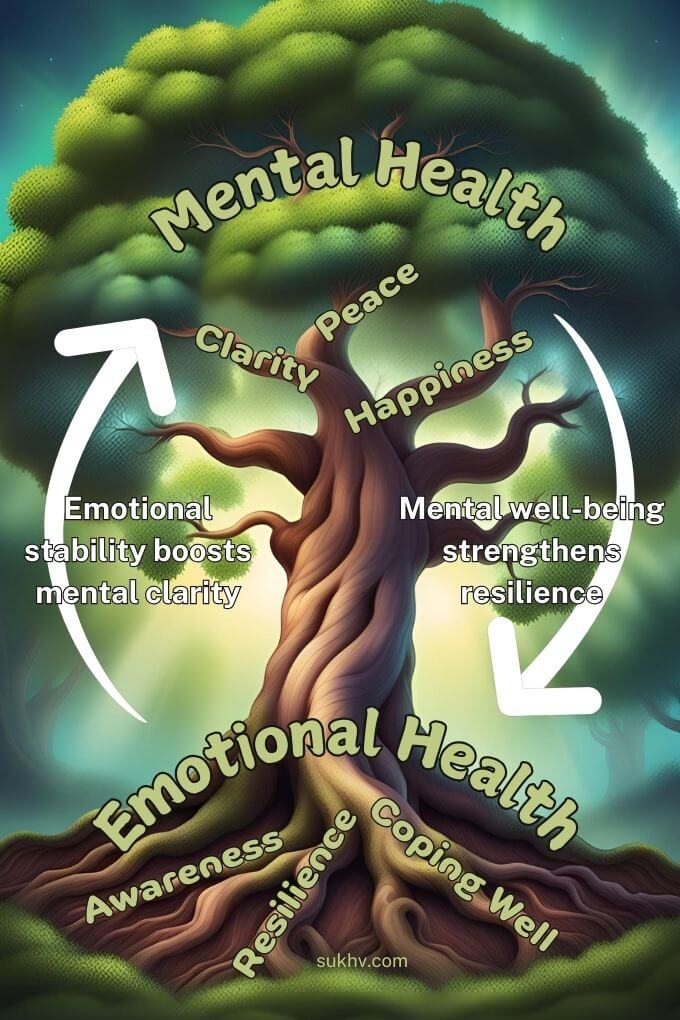
But when emotional health is neglected, mental struggles often follow. Difficulty recognizing, expressing, or managing emotions can contribute to stress, anxiety, and even depression. Research suggests that low emotional awareness in adolescence increases the risk of mental health challenges in teenagers.
Emotional health is the foundation of mental well-being—it builds resilience, strengthens relationships, and shields one from stress. Share on XUnresolved emotional struggles can manifest in various ways—persistent anxiety, mood swings, or unhealthy coping mechanisms like substance abuse. Suppressing emotions may seem like a short-term fix, but bottled-up stress can affect mental well-being over time.
How Does Your Mental Health Affect You Emotionally?
Just as emotions influence the mind, mental health also shapes how you experience and respond to emotions. When your mental well-being is strong, you’re better equipped to process emotions healthily. Stress feels manageable, negative thoughts don’t take over, and you maintain a balanced perspective.
But when mental health declines, regulating emotions becomes harder. Anxiety can heighten emotional sensitivity, making small issues feel overwhelming. Depression can dull emotional responses, making it difficult to feel joy or motivation. Even everyday challenges may feel exhausting when your mental state is low.
The good news? Strengthening your mental health—through self-care, therapy, or positive thinking—can help bring emotional balance. Small steps, like practicing mindfulness, setting healthy boundaries, or seeking support, can make a big difference in navigating life’s highs and lows.
By nurturing mental and emotional health, you create a cycle of resilience, well-being, and inner strength, empowering yourself to handle whatever life brings.
Why Emotional Awareness Matters
It’s taken me time and personal experiences to understand my emotions. I’ve learned that developing this awareness earlier is a powerful way to navigate life with less stress.
Emotional awareness is the key to a balanced and fulfilling life. When you understand your emotions, you gain the power to manage them effectively, make better decisions, and improve your mental well-being.
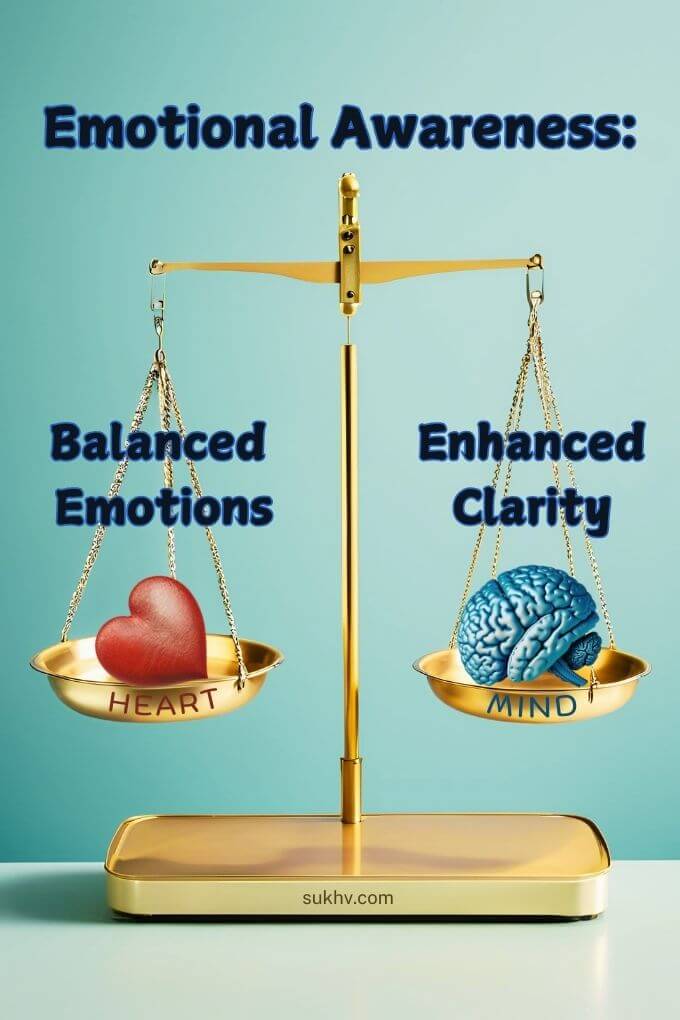
What Is Emotional Awareness?
Emotional awareness is the first step toward building emotional intelligence.
It goes beyond simply recognizing when you’re happy or sad. It’s about understanding the deeper layers of your emotions—why you feel a certain way and how those feelings influence your actions.
Have you ever felt overwhelmed, frustrated, or caught in a swirl of emotions you couldn’t define? Developing emotional awareness helps you identify and process these feelings, and respond thoughtfully rather than impulsively.
This balance between emotions and logic leads to better decision-making, stronger relationships, and inner peace.
Benefits of Emotional Awareness
Every aspect of your life improves when you become more in tune with your emotions. Here’s how:
- Better Response Management: Recognizing your emotional triggers helps you identify patterns in your reactions to different situations. With this awareness, you can pause, reflect, and choose a more thoughtful response rather than acting impulsively.
- Improved Emotional Regulation: Once you understand what sparks certain emotions, you can manage them effectively. This reduces stress, prevents emotional outbursts, and helps you maintain a sense of calm in challenging situations.
- Stronger Decision-Making: Emotional awareness allows you to separate feelings from facts. Instead of letting emotions cloud your judgment, you can assess situations clearly, leading to more balanced and thoughtful decisions.
- Enhanced Communication Skills: Being aware of your emotions enables you to express yourself clearly, listen with empathy, and manage your reactions effectively. This fosters deeper connections and helps you navigate difficult discussions with greater understanding.
- Healthier Relationships: When you recognize and express your emotions openly, you communicate your needs more effectively and set healthier boundaries. This leads to stronger, more meaningful relationships built on trust and mutual respect.
- Stronger Mental Well-Being: Understanding your emotions allows you to address them before they escalate. By practicing self-awareness, you can develop healthy coping strategies—like mindfulness, deep breathing, or talking to a trusted friend—to prevent negative emotions from overwhelming you.
- Greater Self-Acceptance: When you acknowledge your feelings without judgment, you cultivate self-compassion. This leads to a healthier, more positive relationship with yourself and a sense of self-worth.
- Increased Resilience: Life comes with ups and downs, but emotional awareness helps you navigate challenges with strength and adaptability. By embracing your emotions, you build the resilience to face difficulties without feeling consumed.
Consequences of Ignoring Emotional Awareness
Conversely, an absence of emotional awareness can result in suppressed emotions, unresolved conflicts, and heightened stress. Over time, this can contribute to anxiety, depression, and strained relationships.
Emotional awareness helps you lay a strong foundation for emotional well-being and a more fulfilling life. Recognizing and understanding your emotions is not just a skill—it’s a powerful tool for personal growth, deeper connections, and lasting mental resilience.
Why Is Mental and Emotional Health Important?
Key Insight from This Section:
Mental and emotional health shape every part of life—from our relationships to our work and sense of joy. Prioritizing it boosts resilience, enhances well-being, and helps break the silence and stigma around seeking support.
What We Explore:
- Poor Mental Health Impact
- Good Mental Health Benefits
- Normalizing Mental Health Conversations
Impact of Poor Mental and Emotional Health
Poor mental and emotional health can adversely affect daily life, from relationships and work to overall well-being.
Strained Relationships and Social Isolation
When you struggle with anxiety, depression, or past trauma, overwhelming feelings of sadness, fear, and hopelessness can take hold. These emotions may lead to withdrawal from social interactions, making staying connected with friends and family difficult. As confidence fades, isolation can set in, creating a cycle that makes mental health struggles even harder to overcome.
For example, anxiety might cause someone to avoid social activities, while depression can drain energy and motivation, making it difficult to engage with loved ones. When those around us don’t understand this withdrawal, it can lead to misunderstandings, hurt feelings, and conflict—deepening loneliness and self-doubt.
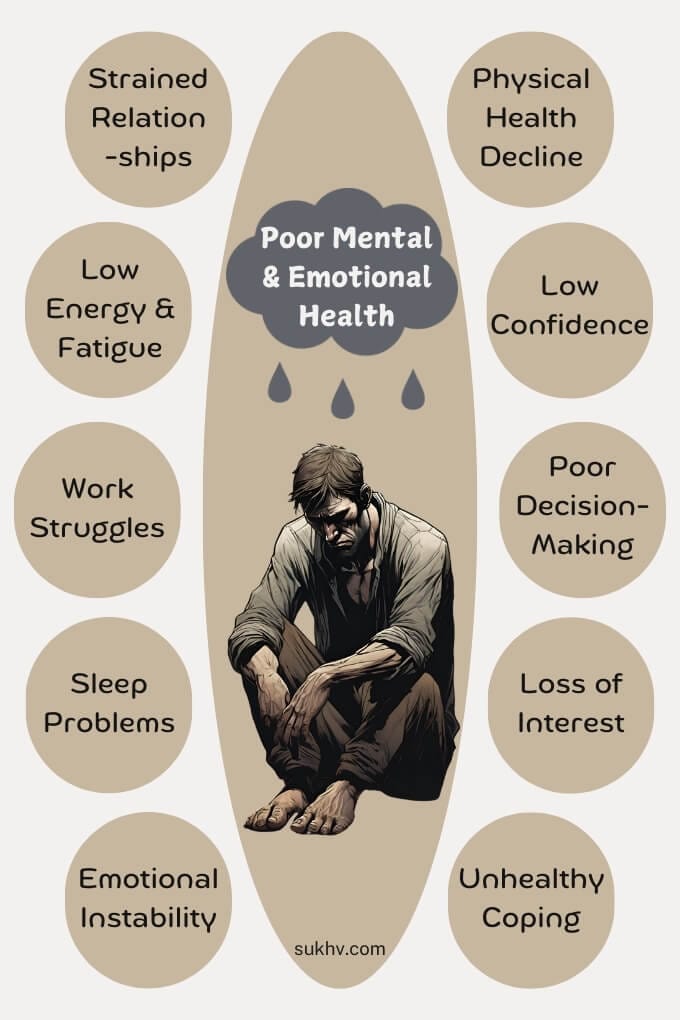
Over time, this cycle of isolation and miscommunication can make it harder to break free.
The isolation that often accompanies mental health struggles can create a vicious cycle, where loneliness further exacerbates emotional distress. Share on XReduced Productivity and Work Challenges
In the workplace, poor mental health can negatively impact productivity and job performance. Anxiety and depression often make it difficult to concentrate, leading to missed deadlines or increased absenteeism. Juggling work responsibilities while managing emotional struggles adds pressure, making it even harder to maintain a healthy work-life balance.
Loss of Joy and Purpose
Beyond work and relationships, mental health and wellness shape our overall well-being. When you’re struggling, the activities you once loved may lose meaning, your sense of purpose can fade, and happiness might feel just out of reach.
However, recognizing these challenges is the first step toward breaking the cycle and reclaiming a fulfilling, balanced life. With the appropriate support and strategies, you can rebuild confidence, reconnect with others, and regain a sense of purpose.
Benefits of Having Good Mental and Emotional Health
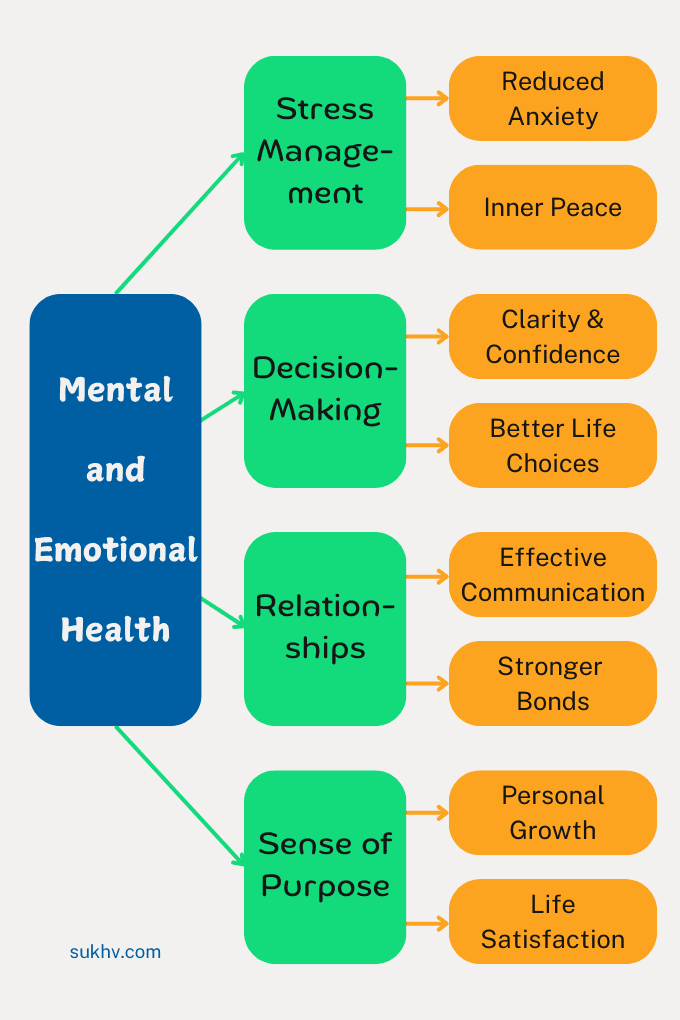
Enhances Resilience and Coping Skills
Good mental health helps us cope with stress, interact with others, and make wise choices. When you prioritize mental health, you manage challenges more effectively.
This focus strengthens relationships, improves decision-making, and allows you to contribute positively to the world. It enables you to reach your full potential and perform well in different areas of life, bringing a sense of joy and purpose each day.
Supports Clear Thinking and Decision-Making
Individuals with strong mental health tend to think clearly, which aids in problem-solving and sound decision-making.
They are better equipped to handle stress and life’s challenges, leading to improved overall well-being.
Boosts Emotional Well-Being and Self-Esteem
Maintaining good mental health helps us feel valued and increases feelings of calm, happiness, and satisfaction. Taking care of your mind can elevate your mood, reduce anxiety, and foster inner peace. It also enhances self-esteem, helping us feel more confident and capable.
Improves Physical Health and Longevity
Good mental health and wellness are closely linked to physical health. It can reduce the risk of disease and support faster recovery. Research has even shown a connection between mental resilience and longevity—individuals with better mental health have a lower risk of early death.
Strengthens Social Connections and Relationships
Good mental health enriches social lives. Emotionally balanced individuals connect more effectively with others, cultivate supportive friendships, and build meaningful relationships.
Enhances Overall Quality of Life
Ultimately, investing in your mental health enhances your quality of life and promotes longevity and joy.
Prioritizing your mental health empowers you to handle challenges, build strong relationships, and find joy and purpose in everyday life. Share on XWhy Normalizing Mental Health Conversations Matters
Going through depression showed me how crucial it is to talk about what we’re feeling. The loneliness of unsupported mental health struggles is something I know too well. We can change this by making mental health conversations normal.
Breaking the Stigma Around Mental Health
Talking about mental health should be as normal as discussing physical health. Yet, stigma often prevents people from seeking help. Many fear judgment or being seen as weak, leading them to suffer in silence. This stigma affects not only individuals but also workplaces, schools, and entire communities.
Men, in particular, may struggle to open up about their feelings due to societal pressures that equate vulnerability with weakness. This reluctance contributes to untreated mental health issues and, in severe cases, higher suicide rates. The more we talk about mental health, the more we can challenge these harmful beliefs and encourage people to seek support.
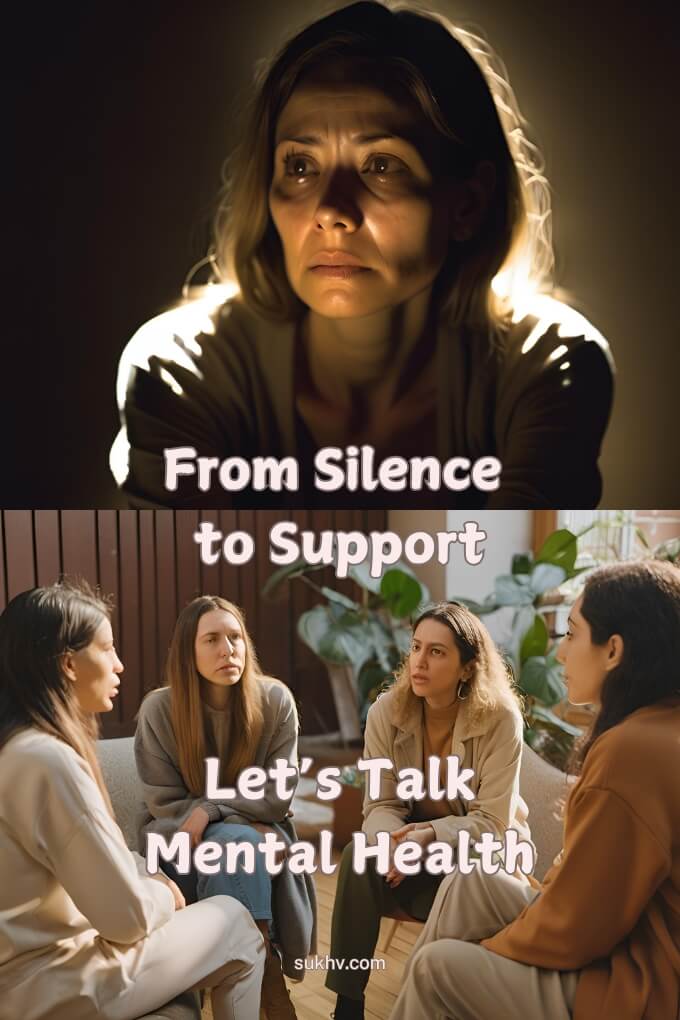
Encouraging Open Conversations in Every Space
Open discussions about mental well-being can make a real difference. Fostering supportive environments in workplaces can reduce stress. Encouraging honest conversations in schools can help students cope with academic pressure. Communities prioritizing mental health create safe spaces where people feel seen, heard, and valued.
When mental health becomes a regular part of our conversations, seeking help feels natural, not shameful. The work of organizations like the National Alliance on Mental Illness (NAMI) of the U.S. clearly shows that support and awareness can change lives. The more we engage in these discussions, the more we build a culture of care and understanding.
When mental health is part of everyday conversations, seeking help becomes natural—not shameful. Share on XMaking Mental Health Education and Awareness a Priority
Mental health is just as important as physical health; however, many people struggle to recognize signs of distress or feel uncertain about seeking help. Education and awareness can change this. By discussing mental health openly—similar to how we talk about physical health—we can replace fear and stigma with understanding and support.
Learning to identify struggles, explore coping strategies, and access resources empowers individuals and communities. The more we discuss mental health, the more we break down the barriers to care. With increased awareness and knowledge, we can create a culture where support is accessible, ensuring no one feels alone in their struggles.
While conversations about mental health have increased, fundamental misunderstandings still exist. For example, when I sought social and emotional support during a difficult divorce and my declining mental health, my near ones misinterpreted my need for moral reassurance as a request for legal support. This misunderstanding deepened my sense of loneliness and highlighted how even our closest relationships can suffer without proper awareness. This underscores the urgent need to educate and empower everyone to recognize and respond to mental health challenges effectively.
Creating a World Where Mental Health Conversations Feel Natural
Open conversations about mental health help break the silence that keeps people from seeking support. When these discussions become normal, people feel safer reaching out, and communities become more powerful. Workplaces, schools, and families create more supportive environments.
Every conversation around mental health and wellness counts. By talking openly, we create a world where mental health is prioritized, individuals are empowered with knowledge on how to improve mental health, stigma fades, and seeking support is a sign of strength—not weakness.
What Factors Affect Your Mental and Emotional Health?
Key Insight from This Section:
Your mental and emotional health is shaped by multiple factors—from brain biology and sleep to relationships, diet, and physical activity. While some aspects are out of your control, many can be actively managed to support your overall well-being.
We Explore the Factors:
- Brain, Sleep & Stress
- Mental Stimulation
- Social Connections
- Diet & Nutrition
- Physical Activity
Lifestyle and environment are key to mental wellness and wellness. Many factors, from your biology to the relationships you nurture shape your mental and emotional health. While some influences are beyond your control, many can be managed to support your well-being. Let’s break them down.
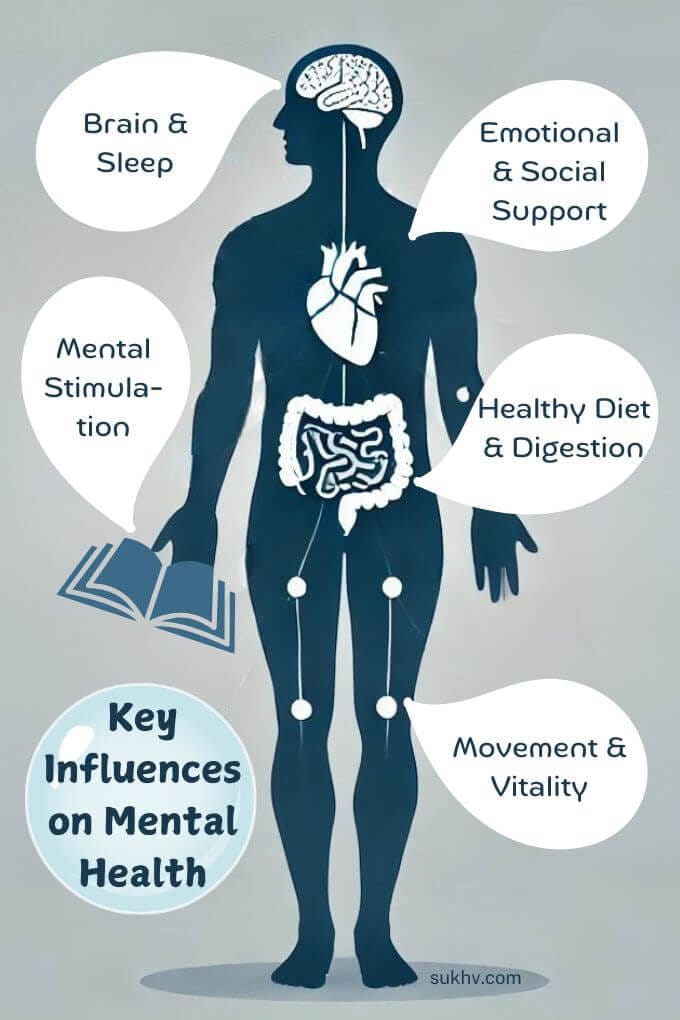
How Do Brain Biology, Sleep, and Stress Response Shape Mental Health?
Your brain is the control center for your thoughts, emotions, and reactions. Its biology—genes, structure, and chemical balance—significantly shapes your mental health.
Conditions like depression and anxiety often have a genetic link, but how you care for your brain also contributes. Getting enough quality sleep helps restore brain function, process emotions, and improve focus.
On the other hand, chronic stress—from work, relationships, or significant life changes—can disrupt your brain’s chemical balance, making it harder to cope. Neurotransmitters like serotonin and dopamine, which influence mood, motivation, and emotions, can lead to mental health struggles when their levels are disrupted.
The good news is that managing stress, prioritizing rest, and maintaining healthy habits can help keep your mind in good shape.
How Does Mental Stimulation Enhance Your Mental and Emotional Health?
Your brain thrives on a good workout. Just as your body benefits from exercise, an active mind stays strong and resilient. Engaging in mentally stimulating activities—cognitive engagement—keeps your brain sharp and enhances emotional well-being. Activities like reading, solving puzzles, or deep conversations boost memory, improve problem-solving skills, and build neural pathways that help you manage stress more effectively.
When you challenge your brain with new hobbies or brain games, you’re keeping it in top shape, reducing the risk of cognitive decline, and maintaining emotional balance. Staying mentally active also fights boredom preventing you from worry and sadness.
Moreover, by collaborating with others and exchanging ideas, you also strengthen your social connections further strengthening your mental health and wellness.
Just like your body, your brain thrives on exercise. Keep learning, exploring, and engaging—your mental wellness depends on it. Share on XWhy Do Relationships and Social Support Matter for Mental Health?
I understand how harmful negative relationships can be to mental health. Based on my experiences, I can’t stress enough the importance of prioritizing healthy relationships from the beginning of adulthood.
We’re wired for connection. Supportive relationships—whether with family, friends, or a community—help you feel emotionally secure and better equipped to handle life’s ups and downs. Having someone to talk to, share experiences with, or lean on during tough times strengthens your resilience and reduces stress.
On the other hand, feeling isolated or stuck in toxic relationships can take a serious toll on your mental well-being. That’s why nurturing healthy connections, setting boundaries, and surrounding yourself with positive and understanding people are essential for your emotional health.
How Does What You Eat Affect Your Mood and Mental Well-Being?
Ever heard the phrase “you are what you eat”? When it comes to mental health, it’s true. Your brain needs proper nutrients to function well. A balanced diet with plenty of whole foods, healthy fats, and proteins supports focus, energy, and emotional stability.
But there’s more to it—your gut health plays a surprising role in how you feel. Scientists have found a strong connection between the gut and the brain, meaning that what you eat can directly impact your mood and stress levels. Processed foods, excess sugar, and poor digestion can contribute to inflammation and even worsen anxiety or depression.
Choosing healthy foods benefits your body and boosts mental wellness.
Nourish your mind with brain care, engaged thinking, strong connections, wholesome food, and movement for lasting well-being. Share on XHow Does Physical Activity Boost Your Mental Strength and Energy?
Moving your body isn’t just about staying fit—it’s one of the best ways to support your mental health. Exercise releases endorphins, also known as “feel-good” hormones, which help reduce stress and lift your mood.
Regular movement also improves sleep, sharpens focus, and boosts energy levels. It doesn’t have to be intense—a simple walk, stretching, or any activity that gets you moving can make a difference.
Physical activity builds resilience, helping you manage emotions and bounce back from challenges more easily. The more you move, the better your mind and body will feel.
How Can You Identify and Address Mental Health Concerns Early
Key Insight from This Section:
By spotting early signs like subtle mood changes or behavioral shifts, you can take timely steps to address mental and emotional distress before it escalates.
What We Explore:
- Poor Mental Health Signs
- Common Mental Health Disorders
Signs of Poor Mental and Emotional Health
Recognizing early signs of imbalance in your mental health and wellness can help you take timely action and seek appropriate support. You can prevent long-term issues and understand how to improve mental health. I learned this the hard way: I missed the early warning signs of my decline.
Unlike a broken bone, these issues can often develop subtly, manifesting through small, sometimes hard-to-detect changes in mood, behavior, and even physical sensations. You might be persistently sad or overwhelmed by worry or find that activities that once brought you joy no longer do.
Common signs include trouble concentrating, changes in sleep patterns—insomnia or oversleeping, and shifts in appetite.
To further clarify, here are some areas to monitor:
Common Emotional Symptoms
You may experience ongoing sadness, anxiety, or a sense of hopelessness. These feelings can make everyday activities feel burdensome rather than enjoyable.
Physical Indicators
Your body can also signal distress. Unexplained headaches, muscle tension, stomach issues, or constant fatigue may all indicate that stress or anxiety is taking a toll.
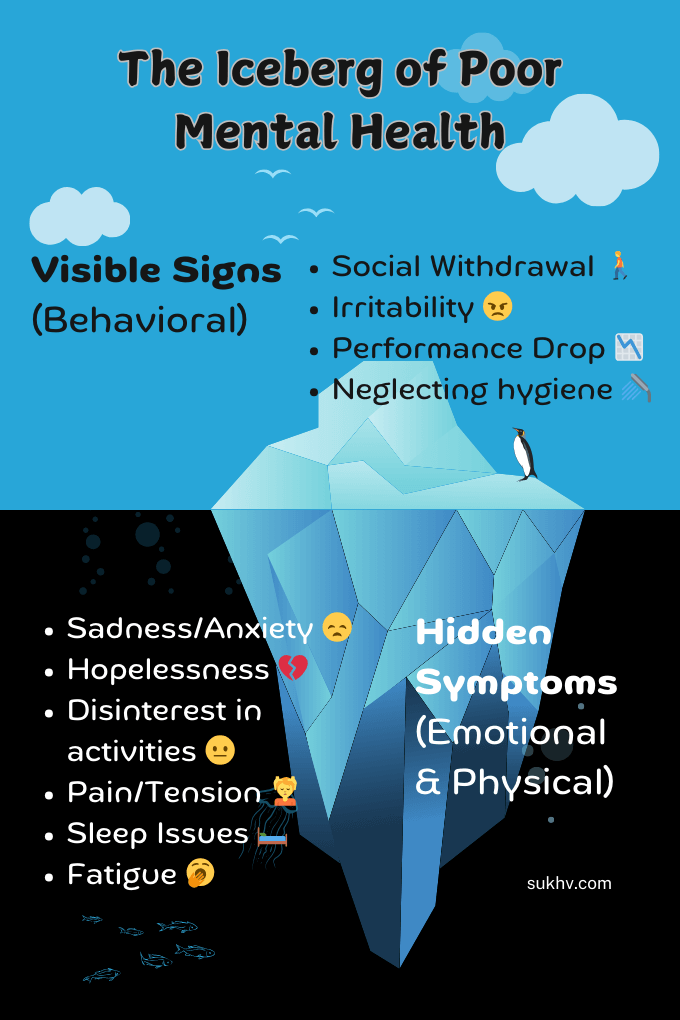
Behavioral Changes
Be observant if you or someone you care about starts withdrawing from social activities and exhibits increased irritability or reduced performance at work or school. You might also notice neglect in personal hygiene and self-care routines. In more serious cases, some individuals may turn to alcohol or drugs as a coping mechanism.
Mental distress isn’t always loud—it may hide in exhaustion, lost joy, or quiet withdrawal. Pay attention to the silent cries for help. Share on XThe National Alliance on Mental Illness (NAMI) lists common signs and symptoms of mental illness for adults and children separately.
Remember, these signs can manifest differently for each person, and experiencing a few symptoms does not necessarily indicate something is seriously wrong. However, recognizing these patterns early on allows you to seek help and improve your well-being.
We all encounter challenges, and taking the first step to identify these signs is a strong move toward leading a healthier, happier life.
Common Mental Health Issues and Disorders
Mental health challenges are more common than many people realize, affecting millions worldwide. Some conditions may cause mild disruptions in daily life, while others can be severe and require professional support. Recognizing these issues early can make a significant difference in managing them effectively.
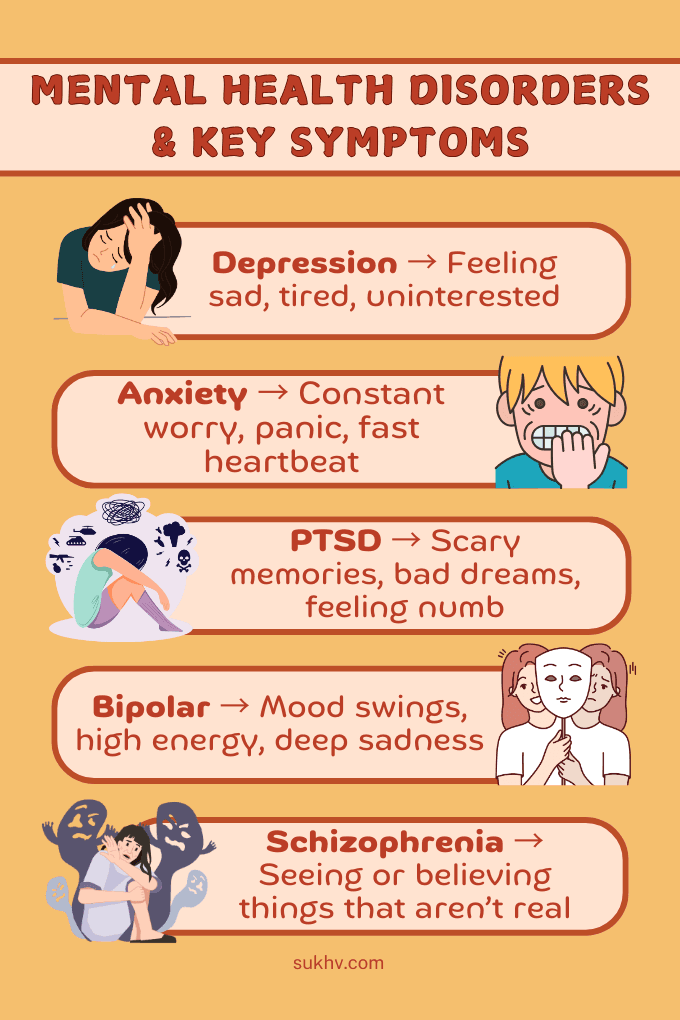
Depression: When Sadness Becomes Overwhelming
Depression isn’t just sadness—it’s a debilitating mood disorder that lingers, making even simple tasks exhausting. It hindered my blogging work, turning even short screen time into a struggle and severely disrupting my sleep. I had to scale back and adopt a gradual, incremental approach.
If you or someone you know is experiencing ongoing sadness, a loss of interest in activities once enjoyed, or constant fatigue, it might be depression.
This condition is often associated with brain chemistry, hormonal changes, or a family history. Prolonged stress, significant life changes, or unresolved emotional pain can also trigger it.
The good news is that with the proper support—whether through therapy, medication, or lifestyle changes—managing depression is possible, and recovery is within reach.
Anxiety Disorders: When Worry Takes Over
Feeling anxious from time to time is normal, but anxiety disorders go beyond everyday stress. Conditions such as generalized anxiety disorder, panic disorder, and social anxiety can lead to excessive worry, sudden panic attacks, or an overwhelming fear of social situations. Physical symptoms—like a racing heart, sweating, or shortness of breath—can make daily life difficult.
If anxiety starts to interfere with work, relationships, or everyday activities, seeking help can bring relief.
Trauma and Stress-Related Disorders: The Lingering Impact of Distress
Experiencing a traumatic event can leave lasting emotional scars. Conditions like post-traumatic stress disorder (PTSD) develop when distressing memories, nightmares, or heightened reactivity persist long after the event. Some individuals may feel emotionally numb or avoid situations that remind them of their trauma.
Recognizing these signs is the first step toward healing, and professional support can help individuals healthily process these experiences.
Mental health challenges are more common than we realize, but early recognition and the proper support can make recovery possible. Share on XBipolar Disorder: Extreme Highs and Lows
Bipolar disorder is more than just mood swings; it involves extreme shifts between manic highs and depressive lows. During manic episodes, a person may feel euphoric, impulsive, or even believe they possess extraordinary abilities. Depressive episodes, on the other hand, bring overwhelming sadness, exhaustion, and hopelessness.
These cycles can make daily life unpredictable, but with proper treatment, stability is achievable.
Schizophrenia and Psychotic Disorders: When Reality Feels Distorted
Schizophrenia and other psychotic disorders affect how a person thinks, feels, and perceives the world. Symptoms often include hallucinations (seeing or hearing things that aren’t there) and delusions (strong beliefs that don’t match reality, such as thinking someone is plotting against them).
These conditions can make it difficult to function daily, but early diagnosis and treatment can help manage symptoms and improve the quality of life.
Why Awareness Matters
Mental health issues don’t just affect emotions; they impact relationships, work, and overall life quality. The more we understand these conditions, the easier it becomes to break the stigma and encourage those affected to seek help. Support is available through various means such as therapy, medication, or simple lifestyle changes. Recovery is indeed possible.
How to Improve Mental Health: 4 Key Steps for Wellness
Key Insight from This Section:
Your mental well-being grows through small, intentional steps: understanding yourself, caring for your mind and body, leaning on support, and knowing when to seek professional guidance.
What We Explore:
- Reflecting on Your Mental State
- Practicing Daily Wellness Habits
- Cultivating Meaningful Connections
- Seeking Professional Support
If you’re wondering how to improve mental health suiting your lifestyle, these four essential steps can help you build resilience and emotional well-being.
Step 1 – Assess Your Mental State Through Honest Self-Reflection
Improving your mental and emotional well-being begins with honest self-reflection and understanding where you are. I learned this through a long, challenging, solo journey. However, the insights gained were highly transformative.
Taking a step back to check in with your thoughts, emotions, and behaviors helps you recognize what’s working in your life and what might need attention.
This process is not about being hard on yourself, it’s about gaining clarity to take meaningful steps forward on the pathway to mental wellness.
Noticing Your Emotional and Mental Patterns
Have you been feeling persistently anxious, irritable, or low? Do certain situations trigger overwhelming emotions? Paying attention to these patterns can reveal underlying stressors.
Beyond just emotions, consider your thoughts: are they mostly encouraging or filled with self-doubt and negativity? How you think shapes your feelings, so recognizing unhelpful thought patterns is crucial.
Your behaviors also provide valuable clues. Have you been withdrawing from social interactions, struggling with sleep, or relying on unhealthy coping mechanisms? These changes can signal that your mental well-being needs attention.
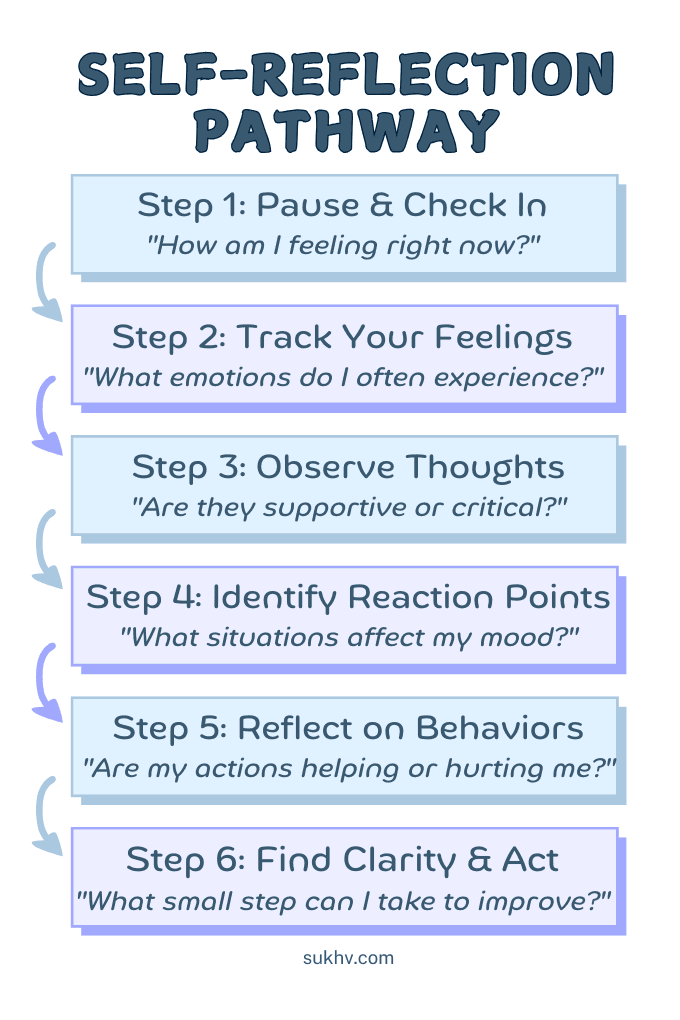
By recognizing these emotional, mental, and behavioral patterns, you can begin to address what’s affecting your wellness.
Journaling: A Powerful Tool for Self-Reflection
Journaling is one of the most effective ways to process your thoughts and emotions. Writing things down helps you untangle your feelings, identify patterns, and make sense of your inner world.
Research suggests that journaling can reduce stress, improve emotional regulation, and even help with conditions like depression and anxiety. A landmark 1999 study in the Journal of the American Medical Association (JAMA) helped establish journaling as a mainstream mental health practice. Over the years, experts have continued to highlight its benefits, from easing anxiety to enhancing self-awareness.
You don’t have to be a skilled writer to benefit from journaling. Setting aside a few minutes daily to jot down your thoughts can provide clarity and relief.
Journaling untangles your thoughts, reveals patterns, and brings clarity—one page at a time. Share on XSetting Realistic Goals for Growth
Once you’ve identified areas for improvement, the next step is to set realistic goals. It’s important to avoid overwhelming yourself with drastic changes. Instead, focus on small, achievable steps that align with your values.
For instance, if anxiety is a challenge, rather than aiming to eliminate it, you could start by practicing short mindfulness exercises each day or challenging just one negative thought at a time. Small wins accumulate, creating a sense of accomplishment and momentum to regain or improve mental health.
Similarly, if you tend to avoid conflict, a good starting point could be learning and practicing healthy communication techniques. Over time, this can strengthen your relationships and enhance your overall well-being.
Self-reflection is an Ongoing Process
Checking in with yourself isn’t a one-time event; it’s an ongoing practice. Regular, honest self-reflection plays a vital role in helping you understand how to improve mental health and identify emotional triggers and areas for growth. It allows you to adjust your goals, build resilience, and make more mindful decisions. The more you engage in this process, the better prepared you will be to navigate life’s challenges and cultivate lasting mental well-being.
By embracing self-reflection with honesty and compassion, you heal yourself mentally and create opportunities for growth and thriving—one step at a time.
Step 2 – Embrace Daily Wellness Practices for a Balanced Life
As I shared earlier, my mental health struggles stemmed from a lack of understanding. However, as I learned more about mental wellness, I gradually adopted daily practices that have significantly improved my well-being.
Taking care of your mental health isn’t just a luxury for your free time—it’s essential for living a balanced and fulfilling life. In today’s fast-paced world, stress, distractions, and responsibilities can sometimes take over, leaving little room for the habits that truly nourish your well-being. This is why making wellness a daily practice—not an occasional fix—can make all the difference.
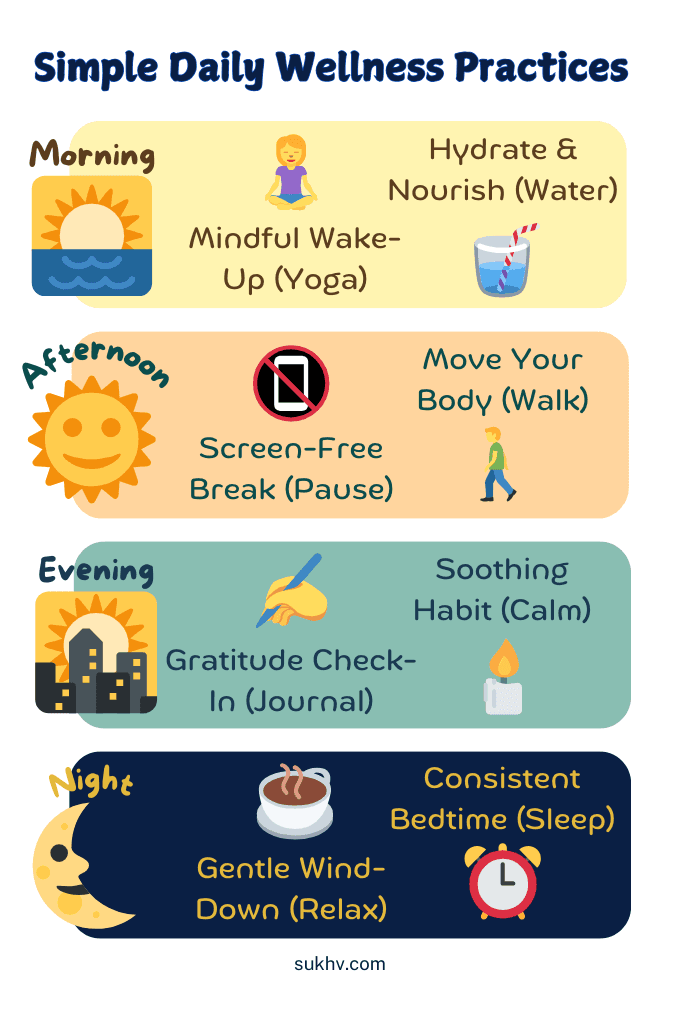
Recharging Your Mind and Body with Self-Care
For a long time, I poured all my energy into others neglecting my well-being. However, a turning point made me realize that self-care isn’t a luxury—it’s essential.
Creating this blog, driven by my passion for helping others and my commitment to self-care, has become a cornerstone of my renewal, nurturing my mind and soul.
Self-care isn’t something you can squeeze in when you have extra time—it’s a daily necessity. Taking moments to rest, unwind, and engage in activities you love refreshes your mind, prevents burnout, and restores your energy.
Simple joys—like reading, painting, playing music, or taking a nature walk—are not just hobbies; they are powerful wellness practices that reduce stress and boost creativity. Setting aside a few minutes for yourself daily can help you feel more balanced, energized, and emotionally resilient.
The key is to make self-care a non-negotiable part of your routine, rather than an afterthought once everything else is done.
Building a Strong Foundation with Healthy Habits
The way you take care of your body has a significant impact on your mind. Eating nutritious meals, staying hydrated, and maintaining a regular sleep schedule lay the foundation of overall well-being.
Movement is also essential—whether stretching in the morning, taking a short walk, or dancing to your favorite song, physical activity releases feel-good hormones that boost your mood and sharpen your focus.
These small, consistent wellness practices improve physical health and provide the energy and mental clarity needed to navigate life more easily.
Small, consistent wellness habits fuel your body, uplift your mind, and bring clarity to your day. Share on XManaging Stress with Mindfulness and Relaxation Techniques
Stress is inevitable, but how you manage it can make all the difference. Simple practices like deep breathing, mindfulness, and meditation have helped me calm my mind and keep myself centered.
Everyday moments—like savoring a meal, observing your surroundings during a walk, or taking a few slow breaths before responding to a stressful situation—can train your brain to stay present.
Over time, these wellness techniques make it easier to let go of negativity, reduce anxiety, and handle challenges with a more focused and calmer mindset.
Sharpening Focus and Mental Clarity with Intentional Practices
In a world full of distractions, staying focused takes practice. Simple habits—like time-blocking, reducing screen time, taking short breaks, and engaging in brain-training activities—can significantly improve concentration and mental clarity. Even small steps, such as creating a daily to-do list or setting aside time for deep, uninterrupted work, can boost productivity and reduce mental overwhelm.
One technique that has worked well for me is the Pomodoro method, working in focused 25-minute sessions with short (5 to 15-minute) breaks throughout the day. This approach has helped me sharpen my focus and made a noticeable difference in managing my mental well-being and productivity.
Incorporating these wellness practices into your daily routine creates a foundation for greater clarity, resilience, and long-term well-being. Small, consistent efforts lead to lasting improvements in both focus and overall mental health.
Step 3 – Cultivate a Strong Social Support Network
We all need a support system—people who genuinely listen, uplift us, and stand by our side through life’s highs and lows. I understand this deeply because I’ve experienced what it’s like to go without it. That absence made me realize how much a strong support network shapes our well-being, not just by providing comfort but by giving us the strength to face challenges with resilience.
Building a strong social support network isn’t just about having company; it’s about creating meaningful connections that enrich your mental and emotional well-being.
Why Does Social Support Matter?
Think about the last time you felt overwhelmed. Did talking to a friend or loved one help lighten the burden? That’s the power of social support.
Having people to rely on brings comfort, reassurance, and practical support when we need it the most. A strong support system eases life’s pressures and reassures us that we’re not alone.
Studies show that strong social connections can ease anxiety and depression while enhancing happiness and overall life satisfaction. Knowing someone is there for us can make a world of difference. We feel a sense of belonging that helps us manage stress, navigate difficult times, and maintain emotional balance.
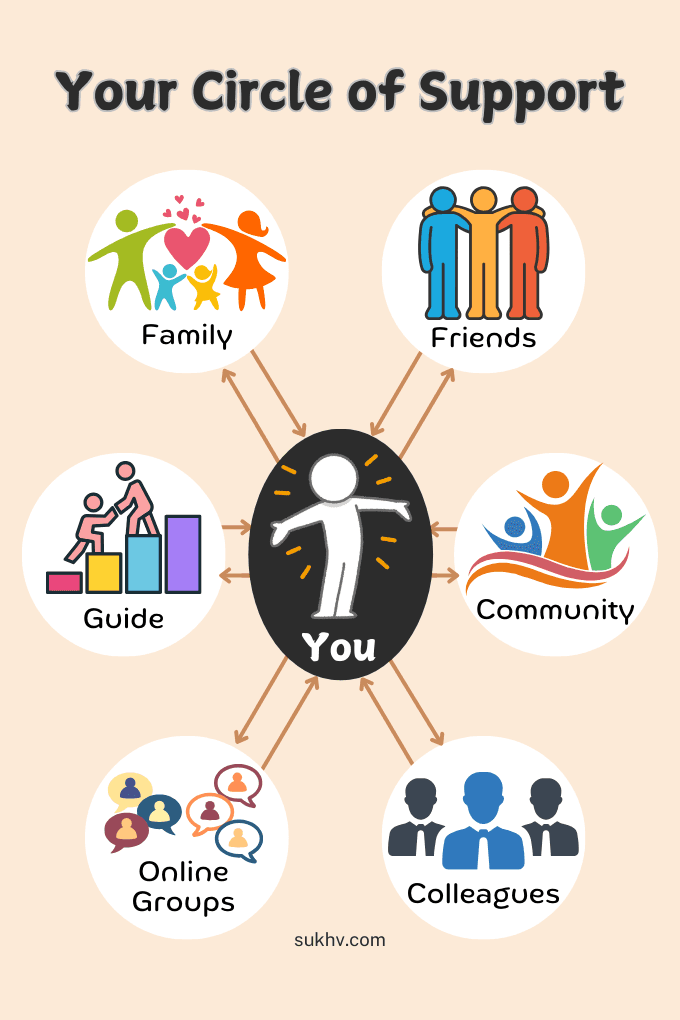
How Can You Strengthen Your Support System?
1. Nurture Existing Relationships
Start by identifying the people in your life who uplift and understand you. Deepen these connections by checking in regularly, spending quality time together, and practicing active listening. A simple message, a heartfelt conversation, or sharing a laugh can strengthen bonds and reinforce trust.
2. Expand Your Circle
If you’re feeling isolated, consider finding new ways to connect. Join interest-based groups, participate in community events, or explore online spaces where like-minded individuals gather. Volunteering is another excellent way to meet supportive people while giving back to others. Even something as small as saying hello to a neighbor can open the door to new friendships.
3. Be the Support You Seek
A strong support network isn’t just about receiving help—it’s also about being there for others. Offer a listening ear, celebrate someone’s achievements, or lend a helping hand when needed. Genuine relationships are built on mutual care and effort, so be the kind of friend you’d want in your own life.
4. Prioritize Face-to-Face Interaction
While digital connections can be valuable, in-person interactions often create deeper emotional bonds. Whenever possible, choose face-to-face conversations over texting or social media. Meeting up for coffee, walking together, or simply sitting down for a heartfelt chat can enhance feelings of connection and understanding.
5. Be Open and Vulnerable
Building meaningful relationships requires authenticity. Don’t be afraid to share your thoughts, struggles, or emotions with trusted individuals. Vulnerability fosters deeper trust and intimacy, allowing for genuine, lasting connections.
Quality Over Quantity
You don’t need a large social circle to feel supported—what matters is the depth of your relationships. Prioritize connections that bring trust, comfort, and mutual support. A strong social network isn’t just a luxury; it’s a crucial pillar of mental and emotional well-being that can help you feel more grounded, resilient, and fulfilled.
Step 4 – Seek Professional Support for Your Mental Well-Being
When experiencing mental challenges, seeking professional help is not a sign of weakness; it’s an essential and proactive step toward feeling better.
When to Reach Out
If overwhelming emotions, stress, or negative thoughts impact your relationships, work, or overall happiness, it might be time to talk to someone who can assist you. We all experience difficult times, and it’s essential to recognize when these feelings extend beyond a passing mood.
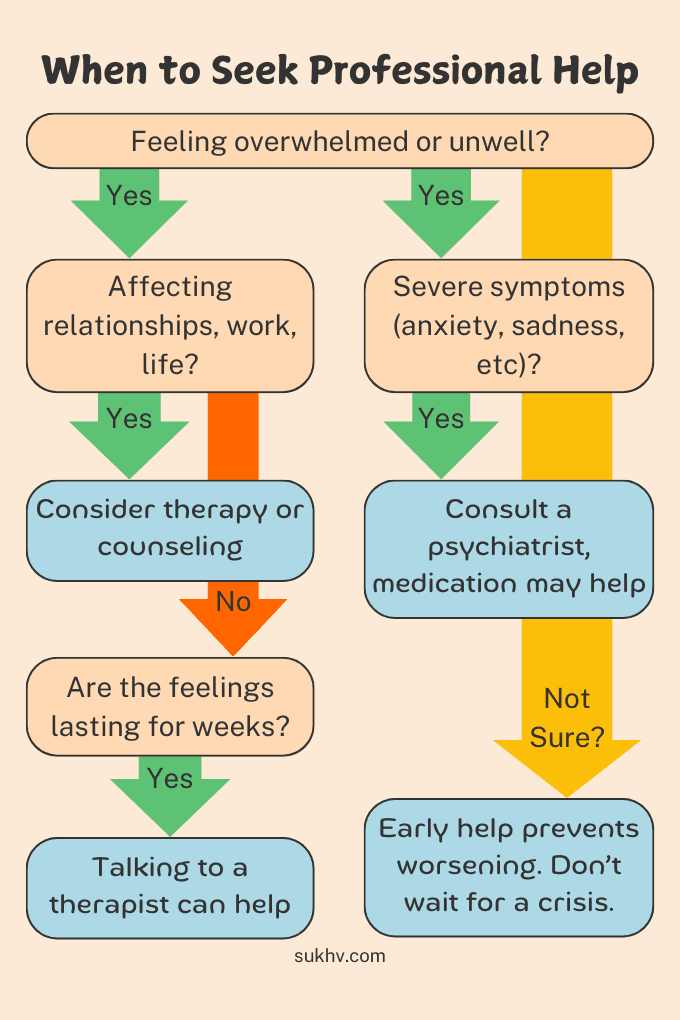
If your struggles feel too heavy to manage alone, remember that you don’t have to face them by yourself. Initially, when my depression began, I didn’t understand what was happening and found it hard to cope without support. Taking the first step to seek help demonstrates strength and a commitment to caring for yourself.
Therapy and Counseling: A Safe Space
Speaking with a therapist or counselor provides a safe environment to explore your emotions. When I first committed to addressing my depression, I experienced the profound relief of a Psychosocial Intervention (PSI) session. Having a professional offer a listening ear allowed my emotions to surface and flow freely.
These professionals can help you understand your thoughts, develop new coping strategies, and guide you through life’s challenges. Therapy isn’t only for big problems; it can also help you grow, know yourself better, and become emotionally stronger. Sometimes, simply sharing your experiences can significantly impact how you cope with life’s difficulties.
Seeking help isn’t a sign of weakness—it’s a step toward strength, clarity, and healing. Share on XWhen to Consider Medication
If your struggles feel particularly intense—such as persistent anxiety, severe depression, or drastic mood swings—it might be helpful to consult a psychiatrist. They can evaluate whether medication could help balance the chemical imbalances in your brain and collaborate with you on a treatment plan.
At first, I believed that practices like meditation and pranayam would be enough to help me heal. But I soon realized that my mental illness ran deeper, with even physical symptoms, like aching in my left hand fingers, surfacing. That’s when I discovered my serotonin imbalance and understood that medication was necessary for my recovery.
While medication isn’t suitable for everyone, it can be an essential part of the solution, especially when combined with therapy. Finding the right approach for you may take time and cooperation with your doctor.
Regardless of your chosen path—individual counseling, group therapy, or a combination of treatments—remember that reaching out for help is a courageous step. Professional support can help you prevent the challenges from escalating and find clarity, relief, and the tools necessary to manage your mental well-being.
How to Maintain Mental Health and Wellness: A Step-by-Step Guide
Key Insight from This Section:
Maintaining mental wellness means learning to bounce back from tough moments, surrounding yourself with what lifts you up, being smart about your screen time, and staying flexible as your needs evolve. It’s a steady process that grows with you.
What We Explore:
- Building Emotional Resilience
- Creating a Positive Environment
- Using Technology Wisely
- Tracking Progress, Making Changes
Once you understand how to improve mental health, maintaining it through consistent strategies is your next course.
Step 1 – Build Emotional Resilience to Handle Life’s Ups and Downs
Life is filled with ups and downs, and while we can’t always control what happens, we can strengthen our ability to handle challenges. This is where emotional resilience comes into play; it helps us bounce back from setbacks, adapt to change, and remain grounded even during tough times.
Building resilience is not about avoiding difficult emotions or striving for constant happiness. Instead, it involves developing inner strength, healthily managing emotions, and maintaining well-being despite life’s uncertainties.
How Can You Cope With Difficult Emotions?
Emotional regulation—the ability to recognize, understand, and respond to emotions in a balanced manner—is a key component of resilience.
When emotions become overwhelming, it’s easy to react impulsively or turn to unhealthy coping mechanisms. However, processing emotions constructively makes a significant difference. Simple practices like deep breathing, mindfulness, journaling, or physical activity can help release tension and restore balance.
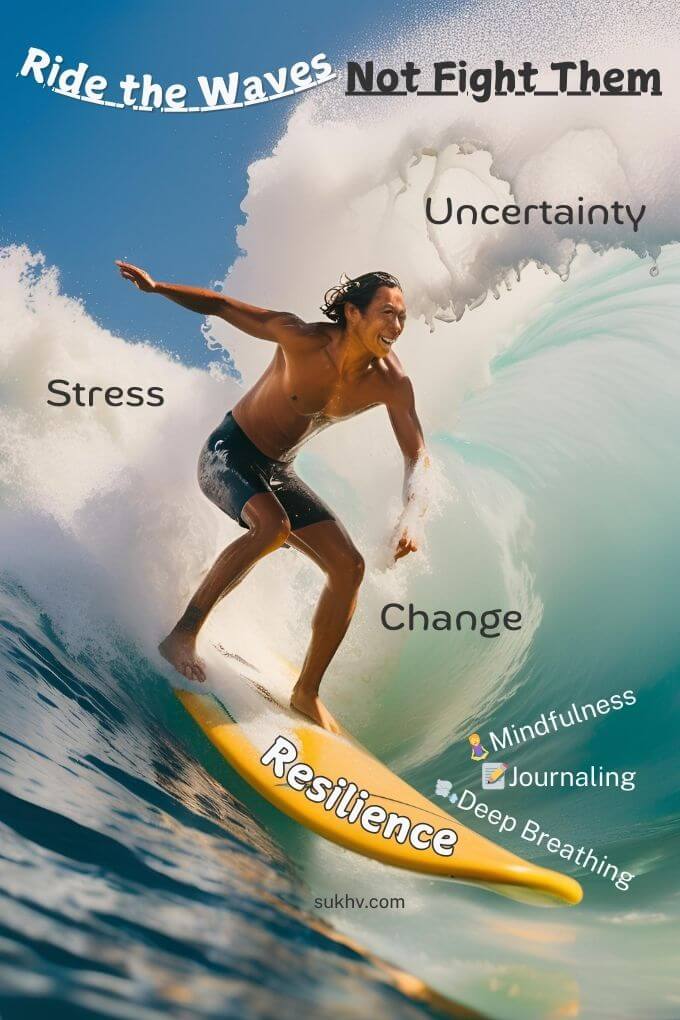
Mindfulness, for instance, encourages you to observe emotions without judgment, which helps you respond thoughtfully rather than impulsively. Cognitive reframing challenges negative thoughts; you recognize setbacks as chances to learn and improve. Engaging in self-soothing activities, like listening to music, walking, or spending time in nature, can also reduce stress and emotional intensity.
Why Is Emotional Intelligence Important for Resilience?
Emotional intelligence strengthens resilience by helping you understand and manage emotions effectively. When you know your feelings, you can respond calmly instead of impulsively, reducing stress and staying in control.
It also enhances awareness of others’ emotions, creating a supportive network that makes it easier to navigate challenges. Empathy deepens connections, encouraging mutual support and reinforcing emotional strength in difficult times.
Emotional intelligence improves adaptability and equips you to handle life’s ups and downs confidently, making it easier to move forward when life gets tough.
Resilience isn’t about avoiding difficult emotions but developing inner strength to navigate life’s uncertainties with balance. Share on XHow Can You Build Emotional Resilience?
Building resilience starts with how you perceive challenges. Viewing obstacles as opportunities for growth fosters perseverance and optimism, helping you learn from setbacks and adapt more effectively. This shift in perspective, often called a growth mindset, strengthens your ability to handle difficulties confidently.
Beyond mindset, connecting to something bigger than yourself (through meaningful activities or pursuing your passions) provides a sense of purpose, motivation, and emotional stability amid life’s uncertainties. Writing this blog gave me direction when I felt lost.
Further, resilience is influenced by factors such as social connections and coping strategies. According to the American Psychological Association (APA), individuals with strong support systems and adaptive coping mechanisms are better equipped to manage stress and adversity.
Research-backed coping strategies, such as mindfulness, journaling, and physical activity, further enhance resilience by promoting emotional regulation. Southern Illinois University Student Health Services outlines these and other techniques that can help build emotional strength over time.
Developing emotional resilience is a lifelong journey, but each small effort enhances your capacity to adapt and grow through challenges.
Step 2 – Create a Positive Environment That Supports Your Well-Being
Your physical and mental surroundings significantly impact how you feel every day. A cluttered space, constant negativity, or unsupportive environments can drain your energy, while a calming, uplifting atmosphere can help you feel more at ease.
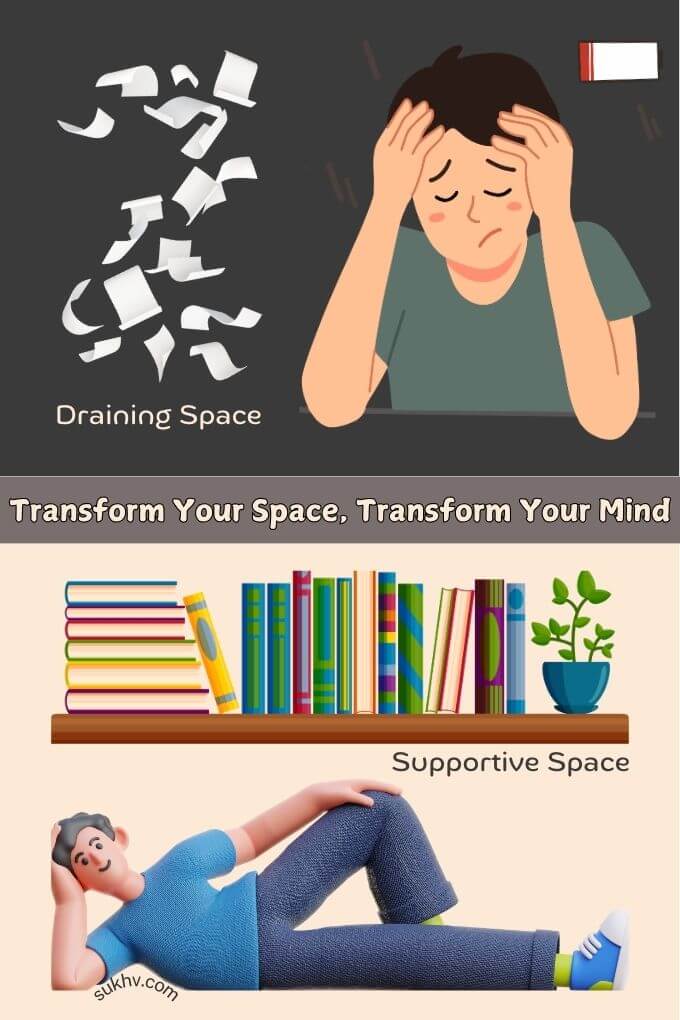
But creating a supportive environment goes beyond avoiding negativity—it’s about intentionally shaping the spaces, influences, and connections in your life.
How Can Your Physical Space Affect Your Mindset?
Consider how you feel when you walk into a messy, chaotic room compared to a clean, inviting space. Your surroundings influence your emotions more than you might realize. A tidy, organized area can instill a sense of calm and control, while elements like soft lighting, natural touches, and soothing colors can make your home or workspace more peaceful.
Small changes, such as decluttering, adding plants, or creating a cozy corner for relaxation, can significantly enhance your overall well-being.
Why Does Your Mental Environment Matter?
It’s not just about your physical surroundings; it’s also about what you allow into your mind. Constant exposure to negativity, whether from toxic relationships, social media, or the news, can weigh you down.
Establishing healthy boundaries, limiting negative influences, and surrounding yourself with uplifting content and conversations can help create a lighter, more supportive mental space. Paying attention to what you consume physically and mentally can play a key role in your well-being.
The spaces you create, around and within you, influence how you feel daily. Design them thoughtfully, and they will elevate your well-being. Share on XHow Can Loved Ones Support Your Mental Health Journey?
Sharing your mental health journey with those close to you can make a difference. When loved ones understand what you’re going through, they are more likely to provide the support, patience, and encouragement you need. This doesn’t mean you have to share everything, but having open and honest conversations can foster an environment at home where you feel safe, understood, and valued.
Small gestures, like a family member checking in on you or respecting your need for alone time, can contribute to a more positive atmosphere.
However, from experience, I know that if you’re already dealing with mental distress due to insensitive or toxic family dynamics and lack of supportive relationships, external communities become essential.
What’s the Value of Peer Support and Online Communities?
Sometimes, the best support comes from people who truly understand your struggles. Peer support groups and online communities can be incredibly valuable in this regard. Whether in person or virtual, these spaces allow you to connect with others facing similar challenges, share coping strategies, and feel less isolated. The anonymity of online platforms can make it easier to open up without fear of judgment, helping to break the stigma surrounding mental health.
Being part of a supportive community can remind you that you’re not alone and that healing is possible, one step at a time.
How you shape your surroundings physically and mentally can impact your well-being. Creating an environment that nurtures you is one of the most effective steps toward improved mental and emotional health.
Step 3 – Use Technology Wisely to Maintain Your Mental Health
Using technology wisely can be a powerful tool for maintaining mental health. Digital resources such as mental health apps, online therapy, and meditation guides provide easy access to support. They help us track our moods, manage stress, and connect with uplifting communities.
For example, the Insight Timer app has significantly aided my meditation practice. Recently, I have found three audio tracks featuring singing bowls and nature sounds like ocean waves, which are highly soothing during my mental health recovery. Their deep, rhythmic beats have a calming effect on both the mind and body, and using earbuds enhances the overall experience.
Pros and Cons of Digital Tools
On one hand, online therapy and mental health apps remove barriers by connecting individuals with professionals and helpful resources, even those living in remote areas or juggling busy schedules. On the other hand, not every tool is ideal. Some apps may oversimplify mental health issues or foster dependency on self-help tips without the guidance of a professional.
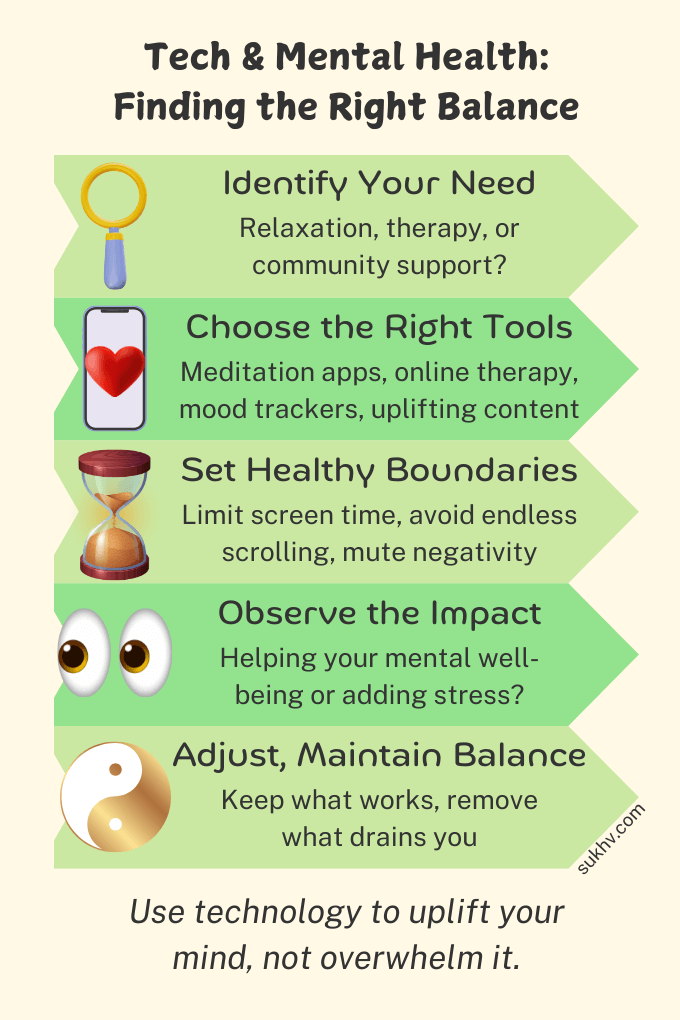
Concerns regarding privacy and the actual effectiveness of these tools also arise.
Technology can support your mental well-being but only when used wisely. Choose digital tools that uplift, not overwhelm. Share on XThe Double-Edged Sword of Social Media
Social media, for instance, can be both beneficial and harmful. Technology helps us connect and find support, but it can also cause us to compare ourselves negatively to others, feel anxious, and even experience cyberbullying. Many of us have felt the stress of maintaining a perfect online image, which can often leave us feeling worse about ourselves.
Mindful Use of Technology
You must be mindful of how you use technology. By setting limits on screen time, selecting uplifting content, and avoiding endless scrolling, you can enjoy the benefits of digital tools without falling into their traps. Whether for yourself or someone else seeking balance and careful use of technology can significantly impact mental well-being.
Let’s choose our digital interactions wisely and make technology a tool for growth and comfort.
Step 4 – Track Your Progress and Make Changes as Needed
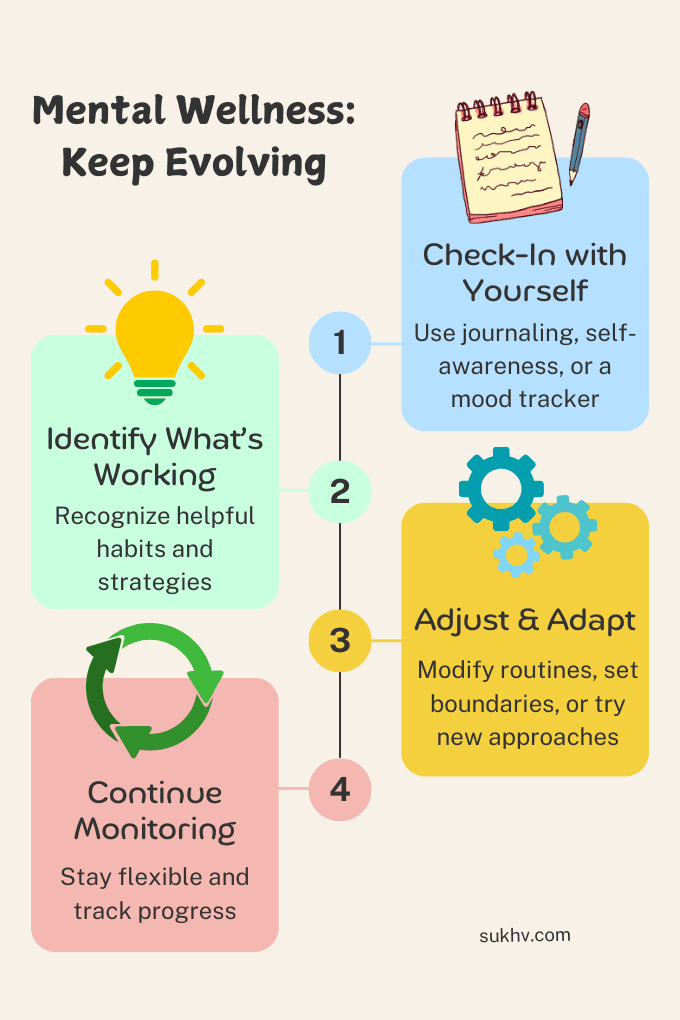
Regular Check-Ins
Maintaining mental health and wellness is not a one-time effort; it’s an ongoing journey. We all experience ups and downs, and regularly checking in with yourself can make a significant difference.
Whether you use a mood-tracking app, keep a journal, or take a quiet moment to reflect, being aware of how you feel each day helps you understand what works for you and what may need adjustments.
Adapting Your Approach
Sometimes, what previously helped you feel balanced may no longer be effective, and that’s perfectly okay. Life changes, and so do your needs.
You might find that your meditation routine requires adjustments or that setting clear boundaries with others significantly improves your well-being.
I experienced this firsthand when I initially stepped away from work and began medical treatment for depression, believing it would be enough. After three years, I realized that the root causes of my distress remained. I embarked on a solo journey lasting a few months to address them. It was during this time, and later, through practicing pistol shooting at a residential academy for about 2.5 years, that I moved forward on my healing journey and learned a few valuable life lessons. Ultimately, I recognized the importance of clear boundaries in relationships, which gave me a more holistic perspective when I resumed medical treatment.
Mental wellness isn’t a one-time fix—it’s a journey. Check in with yourself, embrace change, and adjust as your needs evolve. Share on XBeing open to new self-care strategies or seeking professional advice when necessary can help you maintain your mental health. Remember, every small change you make is a step toward building resilience and taking better care of yourself.
Conclusion: Take Charge of Your Mental Wellness
Your mental and emotional well-being is not just a destination—it’s a lifelong journey. In this post, we’ve explored the vital connection between mental health and wellness, the impact of emotional well-being, and practical ways to strengthen your mind and body. Learning how to improve mental health is an ongoing process, and by applying these strategies consistently, you can build resilience and create a balanced, fulfilling life.
To recap, prioritizing your mental health involves:
- Assessing your current mental and emotional well-being.
- Developing a personalized plan that includes self-care, mindfulness, and emotional resilience strategies.
- Seeking support through social connections and professional help when needed.
- Maintaining consistency, as small, positive changes over time lead to lasting results.
Making mental health a priority is an act of self-care and self-respect. The effort you invest in nurturing your well-being today will enhance your ability to handle life’s challenges and experience greater fulfillment. Remember, this journey is not about perfection; it’s about progress, learning, and adapting as you grow.
By acknowledging the importance of mental health and wellness, you empower yourself to take action. Normalizing conversations about mental health is also essential; when we talk about it openly, it becomes easier to break down stigma and foster a world where seeking support is viewed as a strength rather than a weakness.
Start prioritizing your mental health today. Assess your current state, develop a plan, and take intentional steps toward a healthier, more balanced life. Your mental health is worth the investment. Every small effort adds up, and your journey starts with just one step.
Explore more insights in our complete collection on Mental Wellness.
Now, I’d love to hear from you! What is one daily habit you practice to maintain your mental wellness? Share your thoughts in the comments below.
My blog assists you in navigating life’s challenges with clarity and confidence. As someone in my fifties with diverse experiences who has overcome unique emotional hurdles, I share insights to guide you toward a fulfilling life. Read More